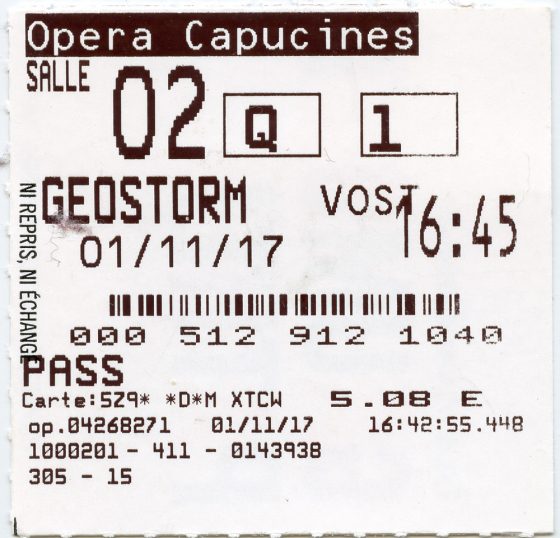Geostorm

I came here to watch people die, goddammit!
I was one of zero people who was excited to see Geostorm and then I saw it, which meant one less person excited to see it. It’s not very good, but I retain my love of the nineties disaster film. Brothers will fight, then make up! Muslims will be revealed not to be terrorists! French guys will be revealed…also not be terrorists!
With Frenchie’s (He’s Egyptian apparently, but there’s no way I’m going to find that honorific and he only works in France anyway M. Amr Waked’s) prominently displayed tricolore on the forearm, I imagined a future where we’re just going to CG in the teams we want to Turn Out To Be The Bad Guy for each market.

But the real reason I saw Geostorm was the Mr. Dean Devlin/Hr. Roland Emmerich œuvre, which tends towards the misanthropic – sure we want the aliens to die, but it’s the white house blowing up that they used as the final shot in the trailer.
There’s something very simple to be learned from Geostorm. We like to watch cities getting blown up and millions die. That’s not the learning problem; we know that already. No, what’s important is who is doing the blowing up, and how it affects our pleasure in the aforementioned blowing up.
The conceit of Geostorm, Mr. Gerard Butler designs a net around the globe to control the weather. Never thee mind that it would require a hundred times the metal that exists on planet earth, say the filmmakers. We only have to render a small part of it.
Why do I imagine that world leaders are currently using the same logic?
Normally this kind of hubris would be the bad guy, and the disaster flow from that. But we have reached Muskian (Elon, not the delightful scent) era of the moderately reprehensible ‘everything will be fine; we’ll just use technology to fix all the problems caused by technology. It hasn’t worked yet, so it’s bound to work soon. It’s the law of large numbers! That’s where we got all our technology from!’

The French are enthusiastic bunch, and the theater was packed because it was Ascension or something. Nevertheless, the audience was silent when the end credits rolled. That is, until the FX supervisor slug. They loved him.
And yes, we’re all going to die, and no one wants to write about it but some lonely idiot talking about how it affects films. But it affects films, goddammit! For Independence Day, it was fun watching LA blow up, because the humans weren’t smart enough to run, and because we knew the aliens were gonna get theirs. For The Day After Tomorrow, it was fun watching the world freeze because, well, in that case, we the actual audience deserved it.
And we fucking well will.
Seeing Hong Kong burn should be fun, and I kept wondering why it wasn’t. There are two reasons. One is the usual suspect: secrets. It takes a very long time to find out that they’re using weather control for a super weapon. Not knowing the motives means we don’t know what’s going on, and generally that means not feeling, well really anything except the mild interest that passes for tension these days.
When it is revealed, very slowly and predictably to be Mr. Ed even-I-can’t-make-this-dialog-work-and-I’m-Ed-Harris Harris, it feels…icky. He kills, I don’t know, billions, in increasingly horrific ways, for blandly villainous reasons. I was conflicted about this mostly because it lead to the only good line in the film: ‘America is a bank disguised as country.’
Mr. Harris is a genocidaire on a massive scale, and, yeah, maybe not so fun for a popcorn movie. Bringing in the topic of genocide spoils the audience’s enjoyment of…um…the death of millions. And that’s bad.
I’ll leave the attribution of the pronoun ‘that’ to you.
The Take

Okay fine. I was worried about that too.
$1.75
The Lonely Comments Section

 [logo]
[logo]